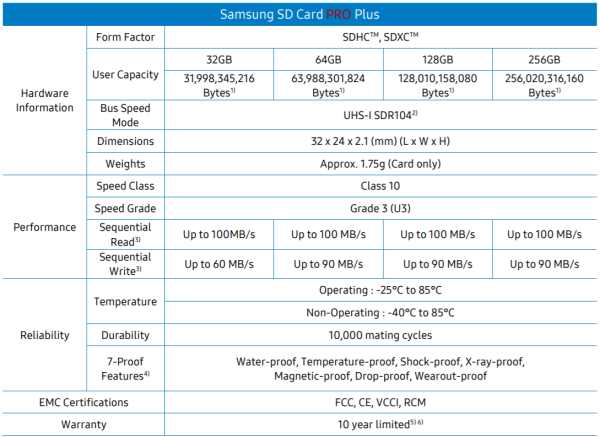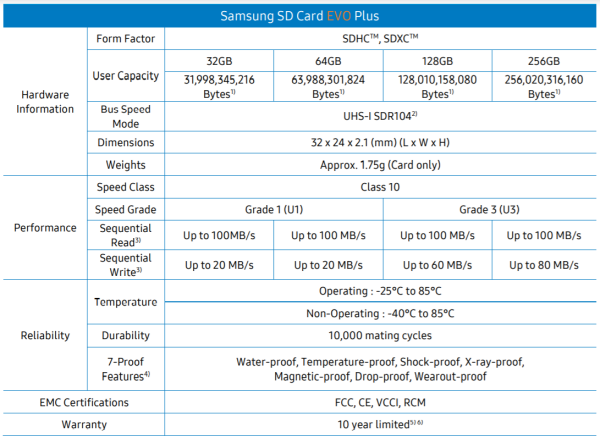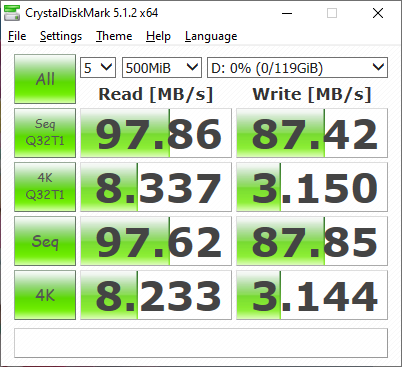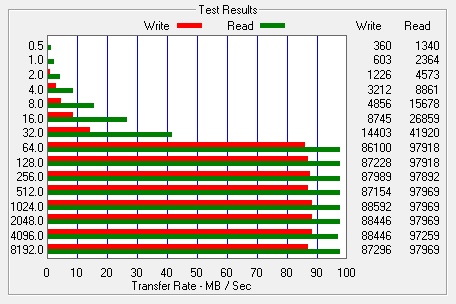
![]()
Model: Samsung PRO Plus and EVO Plus SD Memory Cards
Manufacturer: Samsung Electronics
Provided By: Samsung America
Samsung Electronics has been a leader in the electronics industry for more than 30 years. Since the introduction of their first television in 1970, this Korean company has grown to become one of the world's leading electronics manufacturers, offering everything from tiny semiconductors to large home appliances. Samsung is no stranger to the storage industry either. Along with an assortment of DVD and Blu-ray Disc drives, the company offers both hard drive and flash based storage solutions for the portable and desktop computer markets.
It's been a number of years since Samsung launched its current line of SD and microSD cards. Since then, the company has continued to deliver new memory cards with faster speeds and greater capacities. Samsung recently unveiled two new standard-size SD cards, the PRO Plus and EVO Plus. Available in four storage capacities, ranging from 32GB to 256GB, the two cards support transfer speeds of up to 100MB/s, ensuring smooth playback when editing videos. The PRO Plus also offers sequential write speeds of up to 90 MB/s, allowing users to capture, edit and share high-resolution photos and 4K content.


The PRO Plus and EVO Plus have also been designed with maximum durability in mind and feature Samsung's seven-proof protection. In addition to protection from water, temperature, x-rays, magnets and shocks, these new SD cards are drop-proof and wearproof, withstanding up to a five-meter drop as well as up to 10,000 swipes. To top it all off, both cards come with a 10-year limited warranty.
Samsung's PRO Plus and EVO Plus SD cards come packaged in a cardboard blister pack. The front of the packaging advertises many of the cards' key features including capacity, class rating and rated speeds. The pictures on the front also serve a purpose as they are there to help consumers choose a card based on their intended use. In the case of Samsung's PRO Plus and EVO Plus SD cards, the pictures suggest that they are ideal for devices like DSLR cameras, mirrorless cameras and notebook computers.
The back of the packaging provides a bit more information regarding the features and capabilities of the two cards. Along with the cards' UHS speed class rating, the packaging shows that they are covered by a 10 year warranty and are water, temperature, x-ray, magnet, shock, drop and wearout-proof.
Physical Features:
While not nearly as small as a microSD card, Samsung's PRO Plus and EVO Plus cards aren't much larger than a postage stamp. The cards measure 32 x 24 x 2.1 mm and weigh in at about 1.75g. The two are constructed out of white plastic and have a label on top that shows the capacity, model and speed class ratings.
 |
 |
Along the left hand side of the cards, you can see a lock switch. When it is slid down, the data will be write protected. You will not be able to modify or delete the contents on the memory card until the switch is slid back up.
 |
 |
On the back of the cards, you can see a row of connectors as well as the model number, production batch and serial numbers, and the country of origin. In both cases, the cards are made in the Philippines.
The test system used in this review is equipped with an AMD Ryzen 3 3100 CPU, MSI B550 GAMING PLUS motherboard, 16GB (8GB x 2) of Crucial Ballistix 3200 MHz DDR4 memory, Crucial P5 1TB SSD, GIGABYTE GeForce GTX 1060 WINDFORCE OC 6G graphics card and a Transcend TS-RDF5K USB 3.0 card reader. For the operating system, I used the latest version of Windows 10 Pro.
To test the performance of Samsung's PRO Plus and EVO Plus SD cards, I ran a series of benchmarks using CrystalDiskMark, ATTO Disk Benchmark and PCMark 10. To get a feel for the "real world" performance, I also copied and pasted 1GB of random files and directories as well as a single 4GB ISO file in Windows Explorer.
CrystalDiskMark 5.1.2:
First, I ran a few quick tests using CrystalDiskMark. This benchmark tool measures the performance of a storage device by testing its sequential read and write speeds as well as its random read and write speeds using blocks 512K and 4K in size.
According to Samsung, the 128GB version of their PRO Plus SD card is capable of reading at 100 MB/s and writing at 90 MB/s. While the card performed relatively well, it came up a bit short of these numbers in CrystalDiskMark's sequential read and write speed tests. The EVO Plus performed equally well when reading but, with a rated speed of 60 MB/s, it wasn't as fast as the PRO Plus when writing.
ATTO Disk Benchmark 2.46:
I also used ATTO Disk Benchmark to test the PRO Plus and EVO Plus SD cards' sequential read and write speeds. The test was run using blocks ranging in size from 0.5KB to 8192KB and the total length set to 256MB.
When tested with ATTO, the PRO Plus SD card's read speeds topped out at about 97 MB/s and its write speeds at 88 MB/s. The EVO Plus was also able to read at 97 MB/s. However, it reached a maximum write speed of only 68 MB/s.
PCMark 10 - Data Drive Benchmark:
PCMark 10's Data Drive Benchmark is designed to test drives that are used for storing files rather than applications. You can also use this test with NAS drives, USB sticks, memory cards, and other external storage devices. This benchmark produces an overall score as a measure of drive performance. Comparing devices is as simple as comparing scores. The tests also measure and report the bandwidth and average access time for the drive.
Both cards performed well in PCMark 10's Data Drive Benchmark. The PRO Plus was able to take the top spot though, thanks to its faster write speed and lower average access time.
"Real World" Benchmark:
To test the "real world" performance of Samsung's PRO Plus and EVO Plus SD memory cards, I copied and pasted 1GB worth of randomly generated files and directories. All of the files are between 1KB and 95MB in size and no more than five directories deep. To see how well the cards handled large files, I also copied and pasted a 4GB ISO file.
| Samsung PRO Plus 128GB SDXC | Samsung EVO Plus 128GB SDXC | |
| 1GB Files - Write: | 22 seconds | 24 seconds |
| 1GB Files - Read: | 14 seconds | 14 seconds |
| 4GB ISO File - Write: | 52 seconds | 1:05 |
| 4GB ISO File - Read: | 45 seconds | 45 seconds |
The PRO Plus and EVO Plus performed pretty well here. The two cards were equally fast when reading. However, the PRO Plus was, once again, slightly faster when writing.
Final Thoughts:
Samsung's new PRO Plus and EVO Plus SD cards are a great addition to the company's already impressive line of flash memory cards. Designed and produced in-house, these new standard-size SD cards feature exceptional speeds and, with capacity options ranging from 32GB to 256GB, the ability to store thousands of high-resolution photos or hours worth of 4K Ultra HD video. The PRO Plus and EVO Plus are also built to withstand intensive usage and the most rugged conditions. In addition to being water, temperature, x-ray, magnet and shock proof, the cards are drop and wear proof, allowing them to withstand five-meter drops and up to 10,000 swipes.
Aside from price, the biggest difference between Samsung's PRO Plus and EVO Plus cards is the performance. The PRO Plus is aimed at professionals and, with its ability to read at 100 MB/s and write at speeds up to 90 MB/s, it's perfect for DSLR cameras and 4K camcorders. The EVO Plus isn't as fast when writing, but, with a sequential write speed of 60 MB/s, the higher capacity cards do support 4K Ultra HD recording. The lower capacity cards top out at only 20 MB/s though, making them better suited for HD camcorders, compact cameras and video editing.
Preorders for the PRO Plus and EVO Plus cards begin today (October 13th, 2020) and, in most cases, will be available on October 19th. Suggested retail prices for the PRO Plus range from $10 up to $50 with the EVO Plus running from $7 up to $40.









